1/10/2020
“Why the hell do we still have overhead wires in fire-prone areas?” - Gov. Gavin Newsom
Here is an easy quiz about starting fires from power lines strung up on towers, in comparison with undergrounding those lines.
(1) Which is more likely to break in the wind? In an ice-storm?
(2) Which is more likely to be severed by a falling or flying tree limb?
(3) Which is more likely to be struck and damaged by lightning?
(4) Which is more likely to present a target for deliberate sabotage?
10/7/2019
The Siskiyou Superior Court, on August 29, 2019, issued a Statement of Decision on Writ in the case of We Advocate Thorough Environmental Review (W.A.T.E.R.) and the Winnemem Wintu Tribe (WWT) v. Siskiyou County and Crystal Geyser Water Company, denying the Petitioners’ challenge.
The Petitioners, W.A.T.E.R. and WWT, had challenged the validity of the County’s Environmental Impact Report (EIR) for the Crystal Geyser Water Company Project near the City of Mt. Shasta, citing many errors in fact, procedure, and interpretation of the California Environmental Quality Act (CEQA).
6/14/2019
The Cowlitz River’s path downstream of Randle is the sort of idyllic scene you’d expect to see on the label of a water bottle. As the river traces a route through the Big Bottom Valley, it’s bordered by grassy meadows, with Huffaker Mountain’s forested slopes rising above the terrain. The river’s turquoise waters are evidence of their source, the Cowlitz Glacier near the summit of Mount Rainier.
Locals here say they love the unspoiled terrain, the peace and quiet that comes
4/3/2019
The Winnemem Wintu Tribe and WATER (We Advocate Thorough Environmental Review) have filed two lawsuits to prevent the project, both of which are moving through the court system, said WATER spokesperson Raven Stevens.
The battle over Crystal Geyser’s facility just outside Mt. Shasta City limits on Ski
3/15/2019
In Northern California, the Winnemem Wintu Tribe and the grassroots organization W.A.T.E.R. (We Advocate Thorough Environmental Review) filed an Opening Brief in Superior Court on February 22, continuing a six year community challenge to the flawed EIR for Crystal Geyer Water Company’s bottling plant project at the base of Mount Shasta.
The Crystal Geyser bottling facility project (“Project”) Environmental Impact Report (EIR) was approved by Siskiyou County on December 12, 2017 without
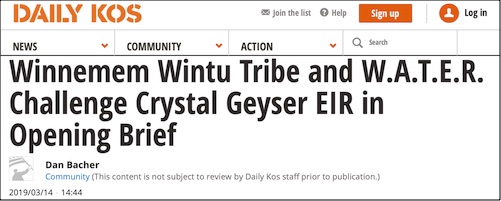
3/14/2019
Breaking News from the Winnemem Wintu Tribe and W.A.T.E.R.:
Mt. Shasta, CA-- The Winnemem Wintu Tribe and the grassroots organization W.A.T.E.R. (We Advocate Thorough Environmental Review) filed an Opening Brief in Superior Court on February 22, continuing a six year community challenge to the flawed EIR for Crystal Geyer Water Company’s bottling plant project at the base of Mount Shasta in Northern California.
"The Crystal Geyser bottling facility project Environmental Impact Report (EIR) was approved by Siskiyou County on December 12, 2017 without any upper limit on the amount of water CG may pump out of the ground and with a faulty and inadequate environmental review of water supply, water quality, traffic, noise, hazards and hazardous materials, air quality, climate change, aesthetics, light and glare, and land use," according to the Tribe and W.A.T.E.R. "In doing so the County violated fundamental mandates of the California Environmental Quality Act (CEQA) and its own land use plans and ordinances.
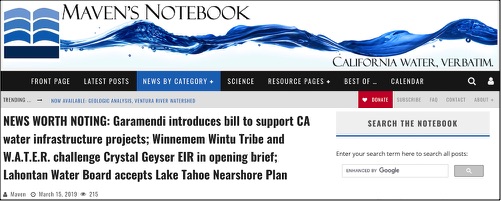
any upper limit on the amount of water CG may pump out of the ground and with a faulty and inadequate environmental review of water supply, water quality, traffic, noise, hazards and hazardous materials, air quality, climate change, aesthetics, light and glare, and land use. In doing so the County violated fundamental mandates of the California Environmental Quality Act (CEQA) and its own land use plans and ordinances.
Village Drive will continue May 10 with a hearing in Siskiyou County court regarding the project’s Environmental Impact Report.
Crystal Geyser initially announced its intention to open the facility to bottle fruit juices with much fanfare in 2013. However, legal challenges have so far foiled its plans.
The Winnemem Wintu Tribe and WATER (We Advocate Thorough Environmental Review) have filed two lawsuits to prevent the project, both of which are moving through the court system, said WATER spokesperson Raven Stevens.

The Statement covered issues of inadequate project description and project alternatives, AB52 violations regarding Tribal Cultural Resources, emissions, hydrology impacts, and county General Plan violations. W.A.T.E.R. and the Tribe contend that each of these issues have not been properly addressed by the court and plan to appeal the decision to a higher court.
“The Court’s Statement does not really address the major issues raised in our Petition,” stated W.A.T.E.R. Board Member Geneva Omann. “The ruling, without much basis in either science or legality, basically rubber-stamps the grossly inadequate EIR, which itself virtually ignored the environmental issues raised by the community. We are convinced that our arguments remain strong and will be properly evaluated in the appellate court.”
with living far off the beaten path. And they’re terrified that Crystal Geyser’s plan to build a water-bottling plant right along the river could have far-reaching consequences for their way of life in the valley — and for everyone who depends on the river, a tributary of the mighty Columbia.
“It’s a sleepy town here in Randle,” said nearby resident Tina Jorgensen. “We have people who retired in this area because that’s the kind of thing they value. … This isn’t an industrial area, and (Crystal Geyser) wants to turn it into one.”
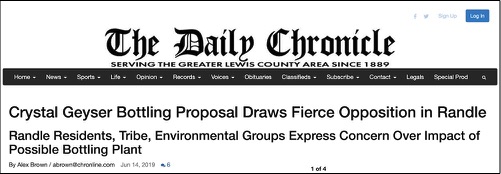

If you answered all questions with “Obviously, power lines strung up on towers,” most all reasonable people would certainly agree with you. But not the most important people. An official of the California Public Utilities Commission wrote, in reference to undergrounding power lines for a local project here in Mount Shasta, ”... there is no evidence to support that doing so would result in a safer system.”
This CPUC opinion gives the green light to the tower project, and rejects undergrounding. But it is surprising, even by the CPUC’s generally pro-utility company standards. According to CPUC’s own website map, the proposed power line runs right through the middle of a “Tier-3” fire threat area. According to the CPUC: “Tier 3 fire-threat areas depict areas where there is an extreme risk (including likelihood and potential impacts on people and property) from utility associated wildfires.”

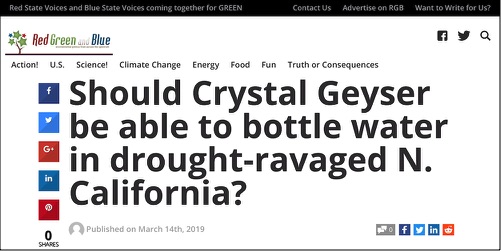
3/14/2019
The Crystal Geyser bottling facility project’s significant environmental problems all stem from its location on the lower slopes of Mount Shasta, a major water source area for all of California, well known for its incredible beauty and extreme environmental sensitivity and within the historic aboriginal territory of the Winnemem Wintu Tribe. The massive bottling facility is adjacent to a quiet, residential neighborhood and upslope from pristine natural springs that are sacred and significant in Winnemem Tribal culture.
The Brief challenges the County’s assertions that it cannot regulate any amounts of Crystal Geyser’s ground water extraction or the operation of the bottling
facility. The County maintains that its only discretionary approval within their authority was a permit for a “caretaker’s residence.” The Brief maintains that the Project contains a misleading and unstable Project Description and impermissibly narrow project objectives and details how the EIR’s impacts analysis is totally insufficient.

5/8/2018
It’s a gorgeous warm day in September 2015. Small cascades of cold, pristine water rush out of the hillside at Big Springs, the headwaters of the Sacramento River, as they converge in a clear and shallow pool located in the Mount Shasta City Park.
Adults and children fill their jugs and bottles with the crystalline water that takes 50 years to make it from snow and rain on Mount Shasta down through the volcanic aquifer to where the torrents converge in the park.
The icy water rushes from the hillside to make its way to Lake Siskiyou, then Lake Shasta and then to the Delta and the ocean. People from throughout the world walk along the creek and hike along shaded trails and footpaths that cross through hedges of horsetail fern and willow and across small bridges.
As people hike to and relax besides Big Springs, Caleen Sisk, Chief and Spiritual Leader of the Winnemem Wintu Tribe, and hundreds of environmentalists and activists from all over California and Oregon hold a rally, the “Water Every Drop Sacred” event, in this scenic park at the Sacramento River headwaters. After the rally ends, Sisk and tribal members lead a march and protest of 160 people to the plant.
News Articles
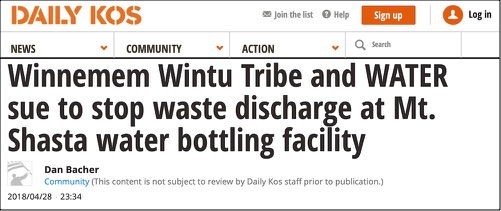
4/28/2018
The Tribe is opposed to the planned opening of the plant, closed after it was operated by the Coca-Cola Bottling Company and other corporations for years, in accordance with its commitment to protect and preserve the Headwaters of the river, the Mount Shasta watershed and sacred tribal lands. Otsuka Holding Co, a Japanese pharmaceutical conglomerate, owns Crystal Geyser.
Move forward to April 28, 2018 and the struggle by the Tribe and local environmentalists to save the headwaters of the Sacramento, the largest and longest river in California, has entered a new stage, a lawsuit against the City of Mount Shasta.
The Winnemem Wintu, who are now leading a campaign to reintroduce winter-run Chinook now thriving in New Zealand back to their home on the McCloud River, and We Advocate Thorough Environmental Review (W.A.T.E.R.) have petitioned the Superior Court of Siskiyou County for a Writ of Mandate (Petition) against the City of Mt. Shasta.
The litigation challenges the city’s March 26, 2018, split-vote approval of the Industrial Waste Discharge Permit for Crystal Geyser Water Company and the city’s conclusion that the project was “adequately considered” in the Environmental Impact Report (EIR) prepared by Siskiyou County, in violation of the California Environmental Quality Act (CEQA).
1/17/2018
On December 12, 2017 the Siskiyou County Board of Supervisors certified the flawed and incomplete Environmental Impact Report (EIR) of the Crystal Geyser beverage bottling project in Mount Shasta, CA. On January 11, 2018 We Advocate Thorough Environmental Review (W.A.T.E.R.) and the Winnemem Wintu Tribe jointly filed a Petition for a Writ of Mandate (Case SCCV-CVPT-2018-41-4) in Siskiyou County Superior Court to require Siskiyou County to “to set aside their approval of the Project and certification of the EIR.”
The Petition states: “In approving the Project as described herein, Respondent County prejudicially abused its discretion in violation of CEQA … because the
County certified an EIR that fails to include information necessary for informed decision making and informed public participation, including information necessary to reach informed conclusions regarding the significance of the Project’s environmental impacts, the effectiveness of mitigation measures to avoid the Project’s significant environmental impacts, or feasibility of mitigation measures to reduce the Project’s significant environmental impacts; because the EIR fails to lawfully assess the Project’s cumulative effects; because the EIR fails to use the best available information and/or accepted methodology for analyzing information; because the Final EIR fails to provide good faith responses to comments on the Draft EIR; because the County failed and refused to provide a stable, finite Project description by obscuring the fact that the only authority the County has over any aspect of Crystal Geyser’s activities relates to the caretaker’s residence Permit only; because, with respect to the findings required by CEQA, the County failed to make required findings, failed to support the findings with substantial evidence, and failed to disclose the analytic route showing how the evidence supports the findings.” (paragraph 36)
9/13/2017
On Friday, September 8th, Siskiyou County released to the public its Final Environmental Impact Report (FEIR) on the Crystal Geyser bottling plant project. Even a brief examination of the 64 pdf documents that comprise the FEIR shows that almost all of the concerns and objections of the over 150 comments submitted on the Draft EIR were inappropriately deemed to be wrong, without merit, or misconceived and given no serious response.
Where a few comments were found to be “with merit,” changes were made but without an analysis of the original flaws in the Draft EIR, merely stating that
these changes make the issues raised “no longer relevant.” This treatment of public comment violates the CEQA Guidelines that mandate responses are to be “addressed in detail giving reasons why specific comments and suggestions were not accepted.” The FEIR found that no mitigations of any sort were needed on issues of air quality, traffic effects, visual aesthetics, aquifer protection, water quality, plastic pollution or hours of operation. In addition, several mitigations from the original DEIR were modified to be less stringent.
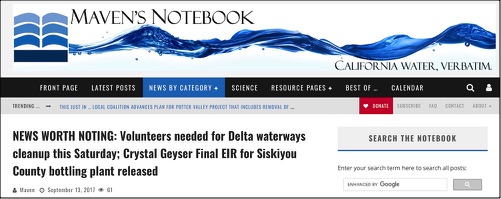
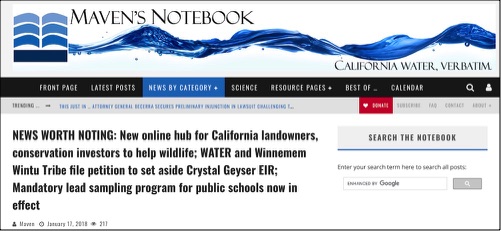

3/15/2017
A multiyear fight over a proposed water bottling plant in Northern California has taken a new turn.
California’s Fair Political Practices Commission (FPPC) has launched an investigation into alleged violations of campaign finance rules by Crystal Geyser Water Company and the Committee for a Strong Siskiyou Economy, No on Measure H. Galena West, chief of the commissions’s enforcement division, announced the probe on March 2.
Crystal Geyser has been bottling and selling Northern California water since 1977. In 2013 it bought an idled Coca-Cola plant in the city of Mt. Shasta,
which it hopes to open. But local residents have pushed back, most recently by launching Measure H last year, a citizen-driven ballot initiative that would have required permits for Crystal Geyser and all other companies pumping water and selling it outside Siskiyou County.
Andy Fusso, founder of the Siskiyou Forward Movement, which backed Measure H, filed a complaint on Feb. 15 to the FPPC alleging that Crystal Geyser and the committee failed to disclose the real value of the campaign signs placed throughout the rural county. They also failed to disclose amounts paid or owed to committee treasurer Kelly Lawler of Hilmar, California, whose business provides campaign services, Fusso said in his complaint.
The Committee for a Strong Siskiyou Economy did not exist until last year, when it launched a campaign opposing Measure H. Fusso called the committee an “astroturf (fake grassroots) entity” funded and controlled by Crystal Geyser, and designed to give a false impression of popular opposition to Measure H.

2/27/2017
The Mount Shasta City Council last week unanimously approved a response letter that lists the City’s numerous concerns about the Draft Environmental Impact Report for the Crystal Geyser bottling facility.
The City’s Responsible Agency letter, among other issues, suggests the plant not operate at night in order to mitigate for noise and vibration. The City is also asking that trucks do not use Spring Hill Drive and that a road repair agreement be developed to help maintain city roads.
Don Burke, who is overseeing the letter’s content, gave a brief overview of the City’s response during a special meeting attended by about 20 people Thursday evening at Mt. Shasta City Park. Burke, an ENPLAN scientist focusing on environmental planning, mentioned the City’s request for dual 18-inch pipes to eliminate a bottleneck in the pipe that would take wastewater from Crystal Geyser to the City’s municipal sewer system.
He also pointed out the City’s request that the Crystal Geyser project meet the City’s light and glare standards, and a recommendation that the public wells be included in the project’s hydrology analysis.
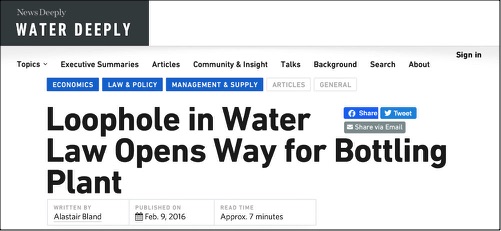
2/9/2016
A LARGE BEVERAGE bottling operation could receive a free pass to use all it wants of a small Northern California community’s groundwater supply, thanks to an obscure allowance in state water laws and a protective trade agreement.
Crystal Geyser has plans to launch a new beverage bottling operation in the small northern California town of Mount Shasta. In response to California’s drought, locals here cut water use by about 40 percent between 2014 and 2015, according to officials. However, an exemption in newly drafted groundwater regulations could give the giant company leeway to use unlimited water from the community’s underground supply. The company has sworn it
will take an insignificant volume of water from the ground and that local wells will not be affected.
The concern among locals, however, is that there is nothing in the law that will curtail Crystal Geyser’s use. That’s because the city of Mount Shasta’s groundwater supply is considered to be a “volcanic basin,” not an “alluvial basin” – a geologic distinction that carries significant consequences under a set of new water use laws.
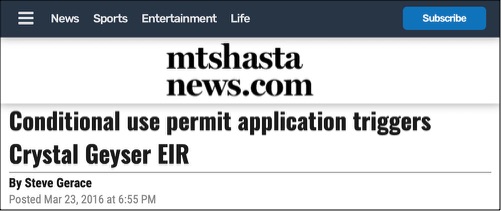
3/23/2016
Siskiyou County Community Development Director Greg Plucker said the county will prepare the EIR, which will consider “the totality” of Crystal Geyser’s operations in Mount Shasta.
Siskiyou County informed Crystal Geyser today that a conditional use permit application submitted to install a caretaker’s/security residence at its Mt. Shasta facility is a discretionary project and is subject to the California Environmental Quality Act.
The county “informed Crystal Geyser that it is in everyone’s mutual interest that
an environmental impact report (EIR) be prepared in conjunction with the submitted use permit application,” according to a press release from Community Development Director Greg Plucker.
Crystal Geyser communications manager Jill Harris said the company has agreed to go forward with the application and the EIR.
The county believes the residence “is integral” to the Crystal Geyser project and, therefore, the EIR “will look at the totality of operations” at the Mount Shasta facility, Plucker said in a phone interview.
“An EIR is, of course, the right step to take,” said Vicki Gold, one of the area residents who have been vocal in demanding an EIR for the bottling facility. “We feel there have been many opportunities that should have triggered it before, but we’ll take it however we get it.”
1/09/2020
LOS ANGELES – The company that produces “Crystal Geyser Natural Alpine Spring Water” pleaded guilty this morning to federal charges of illegally storing and transporting hazardous waste created from filtering arsenic out of spring water at its facility in Olancha, California.
CG Roxane, LLC pleaded guilty to one count of unlawful storage of hazardous waste and one count of unlawful transportation of hazardous material. In a plea agreement recently filed in United States District Court, CG Roxane agreed to pay a criminal fine of $5 million.
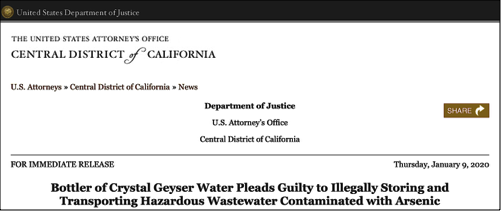
According to court documents, CG Roxane obtained water by drawing groundwater from the eastern slope of the Sierra Nevada mountains that contained naturally occurring arsenic. The company used sand filters to reduce the concentration of arsenic so the water would meet federal drinking water standards. To maintain the effectiveness of the sand filters, CG Roxane back-flushed the filters with a sodium hydroxide solution, which generated thousands of gallons of arsenic-contaminated wastewater.
For approximately 15 years, CG Roxane discharged the arsenic-contaminated wastewater into a manmade pond – known as “the Arsenic Pond” – at its Olancha facility along Highway 395.

1/17/2020
Although there’s nothing legally stopping Crystal Geyser from opening the facility now, a company spokesperson said they “continue to assess (their) California business strategy,” so it’s unclear how they plan to use the 145,000 square foot facility after more than six years of delays due to lawsuits and other red tape.
For the Winnemem Wintu people, the Mt. Shasta area has been home for thousands of years, and water to them is not simply a material resource.
“It is a living being,” said the tribe’s Historic Preservation Officer, Mark Miyoshi. The tribe is working with We Advocate Thorough Environmental Review to protect the aquifer from what they believe is potential disaster if Crystal Geyser opens on Ski Village Drive, just outside Mount Shasta’s city limits.
Two such lawsuits that questioned the validity of Crystal Geyser’s Environmental Impact Report were dismissed in August by the Siskiyou County Superior Court – one against Siskiyou County and another against the city itself. But WATER and the tribe aren’t backing down. Instead, they announced they’re appealing the decision to the appellate court in Sacramento.

5/21/2020
MCSD Director Mike Rorke said that the 2018 agreement was not signed by both parties, making it null and void. It was required to have all of the MASWC executive’s signatures on the contract.
During the McCloud Community Services District meeting on May 11, General Manager Amos McAbier reported that there has been no forward movement with a potential McCloud Artesian Spring Water agreement since the expiration of the 2019 contract.
The MCSD Board agreed to have their lawyer draft a letter to MASWC detailing the lapse in contract and ask them what they want MCSD to do with the remaining balance in the bank account that was committed to funding the water bottling project.
9/4/2020
We are truly concerned about what is happening with the Big Springs residents losing access to water for their domestic use. Reviewing local water history is important. The Gateway Neighborhood residents (near the Crystal Geyser plant in Mount Shasta) experienced the same water shortage issues during CocaCola/Dannon water bottling days and were rebuffed by the county. The board of supervisors told the affected households to speak to the company, who then of course said it couldn’t possibly be from their pumping... even though they pumped more in one day than three of our neighbors pumped in a year! So, when the new CG project was proposed, our
neighborhood had already experienced problems with over-pumping. During the EIR process, WATER and experts urged the County and CG to include the neighborhood wells in the groundwater testing. What we got was misleading theoretical modeling and no testing of our domestic wells. Hence, our lawsuit is now pending a hearing in Appellate Court.
The Gateway Neighborhood in Mount Shasta was hurt by industrial water extraction and now it is homeowners in the Big Springs area being negatively affected. These folks are having the same issues (currently up to about 20 domestic wells affected) because reportedly their aquifer has lowered due to industrial water extraction via trucking.
Historically, Siskiyou County has taken a stance not to regulate water extraction at all: that good old “hands off approach.” In contrast, many counties in the State have strong use permit requirements for anything other than home/domestic well usage. It is time for the BOS and county to join the rest of the state. The county must not shirk its responsibility to protect its citizens and the public’s water.
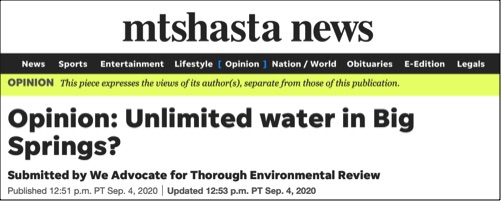
5/17/2021
After seven years of controversy, Crystal Geyser Water Company announced last week that it has given up on opening its Mount Shasta facility.
A representative for the company said Crystal Geyser was “challenged every step of the way” since it purchased the nearly 145,000 square foot facility in 2013.
“This is really good news ... that we’ve been able to successfully defend our neighborhood from inappropriate development,” said Bruce Hillman, a spokesperson for “We Advocate Thorough Environmental Review.” Activists formed the group to oppose Crystal Geyser in Mount Shasta and have since become more vocal about getting businesses to increase sustainability and on water rights issues.
“This vindicates us,” said Mark Miyoshi, historic preservation officer for the Winnemem Wintu Tribe, which works closely with WATER. “We have been working so hard to ensure environmental concerns have been addressed, but we are also cautious, because we don’t know what will happen with that building.”



